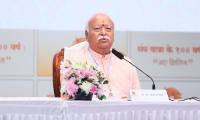India Monday rejected US proposal for a cap on its nuclear testing saying such a provision has no place in a proposed bilateral agreement.
New Delhi, however, made it clear that it was committed to the unilateral moratorium on further tests.
A draft agreement sent by the US stipulated several elements, one of which said cooperation will be discontinued if India were to detonate a nuclear explosive device.
"In preliminary discussions on these elements, India has already conveyed to the US that such a provision has no place in the proposed bilateral agreement and that India is bound only by what is contained in the July 18 Joint Statement, that is, continuing its commitment to a unilateral moratorium on nuclear testing," External Affairs Ministry spokesman Navtej Sarna told reporters when asked about the American proposal.
"The US had shared with India some weeks ago a preliminary draft agreement on Indo-US civil nuclear cooperation under Article 123 of the US Atomic Energy Act," he said.
India's position on the Comprehensive Test Ban Treaty is well-known and continues to remain valid. New Delhi maintains that it will sign the treaty only if it is universal with all countries dismantling their nuclear arsenal.
Under the July 18, 2005, Joint Statement, India and the US are to negotiate a bilateral pact for trade between the two countries in hi-technology material and technology.
The bilateral deal, which is to be negotiated separately, will provide a framework under which the US companies can cooperate with Indian nuclear establishments, including supply of uranium fuel.
The US is hoping to have annual trade worth millions of dollars through this agreement.
India has already presented a plan to separate its civilian and military nuclear facilities on the basis of which the Bush administration is seeking change of US laws.
The legislation in this regard is currently being debated in the US Congress. The nuclear deal, which was clinched on March 2 during the visit of US President George W Bush to India, also makes it incumbent on India to negotiate a safeguards agreement with the International Atomic Energy Agency. In the July 18 Joint Statement, Prime Minister Manmohan Singh conveyed that India would reciprocally agree to be ready to assume the same responsibilities and practices and acquire the same benefits and advantages as other leading countries with advanced nuclear technology, such as the United States.
These responsibilities and practices include signing and adhering to an additional protocol with respect to civilian nuclear facilities; continuing India's unilateral moratorium on nuclear testing and working with the US for the conclusion of a multilateral Fissile Material Cutt-Off Treaty.
The US president, in turn, committed to seek agreement from Congress to adjust US laws and policies and said that the US will work with friends and allies to adjust international regimes to enable full civil nuclear energy cooperation and trade with India.








